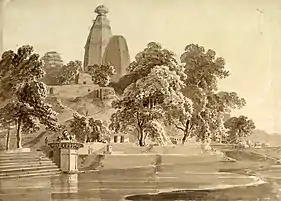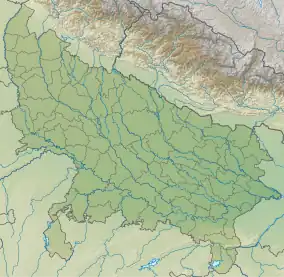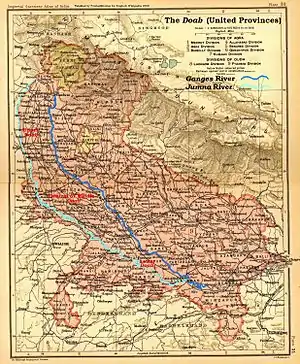Gokul barrage
The Gokul barrage, also Mathura barrage is a barrage on Yamuna River at Gokul in Mathura district, top of which also serves as the road bridge.
| Gokul barrage | |
|---|---|
 Madan Mohan temple on Yamuna. | |
 Location in Uttar Pradesh, India | |
| Country | India |
| Location | Gokul in Mathura district |
| Coordinates | 27°26′35″N 77°42′58″E |
| Status | Functional |
| Opening date | 2003 |

Yamuna has a total of 6 barrages, from north-west to south-east, Dakpathar Barrage (Uttarakhand), Hathni Kund Barrage (172km from Yamunotri origin, replaced the older defunct Tajewala Barrage in Haryana), Wazirabad barrage (244km from Hathnikund to north Delhi), ITO barrage (central Delhi), Okhla barrage (22km from Wazirabad to south Delhi, "New Okhla barrage" is later-era new barrage) and Mathura barrage (at Gokul, Uttar Pradesh).[1][2][3][4]
History
Gokul Barrage, 7 km downstream from Mathura,[5] was proposed to be completed by March 2003, to supply 30 cusec water to Mathura and Vrindavan and also 115 cusec water to Agra.[6]
Concerns
The construction of barrage has reduced the flow of Yamuna and water downstream of Mathura has become more polluted due to lack of flushing.[7]
Navigation restoration
Yaumna river is part of National Waterway NW110, one of India's 111 National Waterways.[8]
References
See also
Citations
- Bharati Chaturvedi, 2010, Finding Delhi: Loss and Renewal in the Megacity
- ML Ahmed, Analysis of Discharge and Gauge-Level Data at Old Railway Bridge, Int'l Conference on Artificial Intelligence, Energy and Manufacturing Engineering (ICAEME’2014), 9-10 June 2014, Kuala Lumpur (Malaysia).
- Regional plan
- Bharati Chaturvedi, 2010, Finding Delhi: Loss and Renewal in the Megacity, Page 78.
- K. T. Ravindran, 1990, The ghats of Mathura and Vrindavan, proposals for restoration, INTACH.
- Shankarlal C. Bhatt,2005, Land and People of Indian States and Union Territories
- David L. Haberman, 2006,River of Love in an Age of Pollution: The Yamuna River of Northern India
- Steamer service to revive navigation in Agra Canal after 143 years, Hindustan Times, 1 Feb 2017.